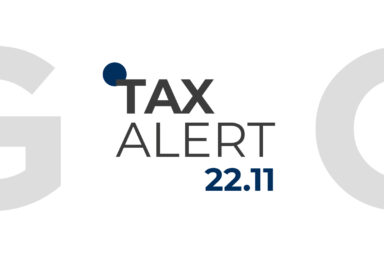Important Changes in the Regulation of Banks Activities
On November 16, 2017, the Verkhovna Rada of Ukraine adopted the long-awaited Law “On Simplification of Business Environment and Attraction of Investments by Securities Issuers” (draft Law No. 5592-d), which provides for significant changes in the regulation of activities of both banks and joint-stock companies as a whole.
On November 16, 2017, the Verkhovna Rada of Ukraine adopted the long-awaited Law “On Simplification of Business Environment and Attraction of Investments by Securities Issuers” (draft Law No. 5592-d), which provides for significant changes in the regulation of activities of both banks and joint-stock companies as a whole.
In particular, the Law lifted the restrictions stipulated by Article 6 of the Law “On Banks and Banking Activities”, according to which banks could exist only as public joint-stock companies (PJSC). From now on, the updated version of the Article provides for the possibility for banks to exist as private joint-stock companies, but with due regard to the specifics of the legislation on banks and banking activities.
Such liberalisation in approaches to the organisational and legal form of banks is primarily related to the fact that as from January 1, 2018, all issuers (except for ICI (institutes of collective investment), which have not accordingly disclosed information about the public offering of securities, or securities thereof are not listed as of the day of entry into force of this Law, are considered to be subject to the requirements of the legislation on private joint-stock companies (PrJSC).
According to the updated version of Article 34 of the Law “On Securities and Stock Exchange”, the public offering of shares is the filing of an application for the admission of securities to trading on the stock exchange in terms of their inclusion in the stock exchange register. The stock exchange register, in its turn, provides for the information about listed securities.
Please be reminded that as from 2016, the National Commission on Securities and Stock Market (NCSSM) significantly strengthened the listing requirements for shares, namely:
For the first level of listing:
- The issuer exists for at least five years;
- The issuer’s equity is at least UAH 1,000,000,000;
- The net annual income from sales of goods, works, and services for the last financial year makes not less than UAH 1,000,000,000 (except for banks);
- The average value of the issuer’s market capitalisation is not less than UAH 1,000,000,000;
- The minimum share of stocks in free circulation is not less than 25%, while two investors hold in total not more than 50% of this share;
- The number of the issuer’s shareholders is not less than 500;
- The number of independent members of the issuer’s supervisory board is at least 25% of the number of members of the board
- The corporate secretary position has been established by the issuer;
- The issuer’s supervisory board has established the internal auditor position (or created the internal audit service);
- The issuer conducts annual auditing, involving an independent external auditor (for at least three years);
- The issuer complies with the principles of corporate governance and the international standards for financial reporting;
- The issuer has concluded an agreement with the market maker to support the liquidity of shares.
For the second level of listing:
- The issuer exists at least three years;
- The issuer’s equity is at least UAH 400,000,000;
- The net annual income from sales of goods, works, and services for the last financial year makes not less than UAH 400,000,000 (except for banks);
- The average value of the issuer’s market capitalisation is not less than UAH 100,000,000;
- The minimum share of stocks in free circulation is not less than 10%, while two investors hold in total not more than 50% of this share (except for restricted shares and state-owned shares);
- The corporate secretary position has been established by the issuer;
- The issuer conducts annual auditing in accordance with the international auditing standards and involving an independent external auditor (for at least two years);
- The issuer is recommended to adhere to the principles of corporate governance and the international standards for financial reporting.
Thus, all joint-stock companies, including banks, that do not meet at least one of the above requirements, will be deemed to have failed to pass the listing procedure and make public offering for their own shares. Accordingly, they will be subject to the provisions of the legislation on private joint-stock companies.
In this regard, the Law established the obligation for all PJSC, in particular banks, to bring their charters and internal regulations in line with the requirements of the legislation within a year from the date of entry into force of this Law.
For this purpose, shareholders have either to make a decision on changing their company’s type from public to private and make appropriate changes to the charter and internal regulations at the general meeting of shareholders, or go through the listing process in accordance with the procedure established by the law.
Please note! The Law stipulates that from now on the type of a joint-stock company is not an obligatory part of the name of the joint-stock company. Shareholders have the right to establish, at their own discretion, the need for indicating the type of company, which is reflected in the relevant provisions of the charter. However, even under such circumstances, in order to bring the charter in line with the legislation, all joint-stock companies are obliged to make a decision about setting forth the company’s charter in a new wording and register the relevant changes in the USR. Otherwise, as from January 1, 2019, they will, in fact, remain outside the legal framework.
Also, it should be noted that the Law No. 5592-d also provides for new requirements for the publicly offered securities prospectus, namely: the prospectus must contain all the information necessary to enable investors to make a reasoned assessment of the financial state of assets and liabilities and the prospects of an issuer and any person ensuring the fulfilment of the obligations of the issuer for such issue, as well as rights under such securities; this information has to be presented in the form that is easy to understand and analyse.
Given the fact that the vast majority of joint-stock companies try to resolve all the necessary issues at the regular general meetings held until April 30 each year, in fact, banks are left no more than three months to approve the issue of changing the company’s type at the level of the supervisory board and include relevant issues in the agenda of the general meeting of the joint-stock company’s shareholders.
Sign up to be aware
New achievements are inspired by information. GO further, don’t miss out GOLAW news and legal alerts
Our expertise
-
- Antitrust and Competition
- Banking and Finance
- Compliance, Corporate Governance and Risk Management
- Corporate and M&A
- Criminal and White Collar Defence
- Defense in Anti-corruption procedures and regulations
- Labor and Employment
- Natural Resources and Environment
- Government Relations (GR)
- Insolvency and Corporate Recovery
- Intellectual property
- International trade
- Legal support of business and private Сlients in Germany
- Litigation and dispute resolution
- Private clients
- Real Estate and Construction
- Renewable energy
- Restructuring, Claims and Recoveries
- Martial Law
- Tax and Customs
-
- Agribusiness
- Aviation
- Chemical industry
- Engineering, Construction and Building Materials
- Natural Resources and Environment
- Financial institutions
- IT and AI
- Industry and manufacturing
- Healthcare industries, Life sciences and Pharmaceuticals
- Media, Entertainment, Sports and Gambling
- Retail, FMCG and E-Commerce
- Transport and Logistics
We use cookies to improve performance of our website and your user experience.
Cookies policy
Cookies settings


